Related Research Articles

Cornwall is a historic county and ceremonial county in South West England. It is recognised as one of the Celtic nations, and is the homeland of the Cornish people. Cornwall is bordered to the north and west by the Atlantic Ocean, to the south by the English Channel, and to the east by the county of Devon, with the River Tamar forming the border between them. Cornwall forms the westernmost part of the South West Peninsula of the island of Great Britain. The southwesternmost point is Land's End and the southernmost Lizard Point. Cornwall has a population of 568,210 and an area of 3,563 km2 (1,376 sq mi). The county has been administered since 2009 by the unitary authority, Cornwall Council. The ceremonial county of Cornwall also includes the Isles of Scilly, which are administered separately. The administrative centre of Cornwall is Truro, its only city.

Cornish is a Southwestern Brittonic language of the Celtic language family. It is a revived language, having become extinct as a living community language in Cornwall at the end of the 18th century. However, knowledge of Cornish, including speaking ability to a certain extent, continued to be passed on within families and by individuals, and a revival began in the early 20th century. The language has a growing number of second language speakers, and a very small number of families now raise children to speak revived Cornish as a first language. Cornish is currently recognised under the European Charter for Regional or Minority Languages, and the language is often described as an important part of Cornish identity, culture and heritage.

Saint Piran or Pyran, died c. 480, was a 5th-century Cornish abbot and saint, of Irish origin. He is the patron saint of tin-miners, and is also generally regarded as the patron saint of Cornwall, although Saint Michael and Saint Petroc also have some claim to this title.
Cornwall is a Celtic nation with a long musical history. Strengthened by a series of 20th century revivals, traditional folk music has a popular following. It is accompanied by traditions of pipers, brass and silver bands, male voice choirs, classical, electronic and popular music.
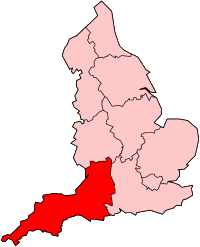
West Country English is a group of English language varieties and accents used by much of the native population of South West England, the area sometimes popularly known as the West Country.

John of Cornwall, in Latin Johannes Cornubiensis or Johannes de Sancto Germano was a Christian scholar and teacher, who was living in Paris about 1176.

St Germans is a village and civil parish in east Cornwall, England. It stands on the River Tiddy, just upstream of where that river joins the River Lynher; the water way from St Germans to the Hamoaze is also known as St Germans River.
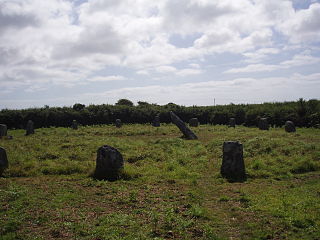
The history of Cornwall goes back to the Paleolithic, but in this period Cornwall only had sporadic visits by groups of humans. Continuous occupation started around 10,000 years ago after the end of the last ice age. When recorded history started in the first century BCE, the spoken language was Common Brittonic, and that would develop into Southwestern Brittonic and then the Cornish language. Cornwall was part of the territory of the tribe of the Dumnonii that included modern-day Devon and parts of Somerset. After a period of Roman rule, Cornwall reverted to rule by independent Romano-British leaders and continued to have a close relationship with Brittany and Wales as well as southern Ireland, which neighboured across the Celtic Sea. After the collapse of Dumnonia, the remaining territory of Cornwall came into conflict with neighbouring Wessex.
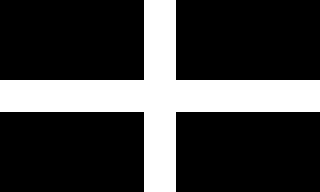
The constitutional status of Cornwall has been a matter of debate and dispute. In modern times, Cornwall is an administrative county of England.

The culture of Cornwall forms part of the culture of the United Kingdom, but has distinct customs, traditions and peculiarities. Cornwall has many strong local traditions. After many years of decline, Cornish culture has undergone a strong revival, and many groups exist to promote Cornwall's culture and language today.
The Cornish people or Cornish are an ethnic group native to, or associated with Cornwall and a recognised national minority in the United Kingdom, which can trace its roots to the ancient Britons who inhabited southern and central Great Britain before the Roman conquest. Many in Cornwall today continue to assert a distinct identity separate from or in addition to English or British identities. Cornish identity has been adopted by migrants into Cornwall, as well as by emigrant and descendant communities from Cornwall, the latter sometimes referred to as the Cornish diaspora. Although not included as an explicit option in the UK census, the numbers of those claiming Cornish ethnic and national identity are officially recognised and recorded.

Cornish literature refers to written works in the Cornish language. The earliest surviving texts are in verse and date from the 14th century. There are virtually none from the 18th and 19th centuries but writing in revived forms of Cornish began in the early 20th century.

Sithney is a village and civil parish in West Cornwall, England, United Kingdom. Sithney is north of Porthleven. The population including Boscadjack and Crowntown at the 2011 census was 841.
Cornish Americans are Americans who describe themselves as having Cornish ancestry, an ethnic group of Brittonic Celts native to Cornwall and the Scilly Isles, part of England in the United Kingdom.
Cornish surnames are surnames used by Cornish people and often derived from the Cornish language such as Jago, Trelawney or Enys. Others have strong roots in the region and many in the UK with names such as Eddy, Stark or Rowe are likely to have Cornish origins. Such surnames for the common people emerged in the Middle Ages, although the nobility probably had surnames much earlier on. Not until the later Middle Ages did it become necessary for a common man to have a surname. Most surnames were fully established throughout Cornwall by the end of the 15th century. Today Cornish surnames can be found throughout the world as part of the Cornish diaspora.
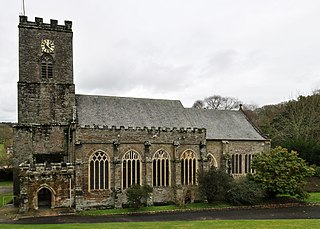
Christianity in Cornwall began in the 4th or 5th century AD when Western Christianity was introduced into Cornwall along with the rest of Roman Britain. Over time it became the official religion, superseding previous Celtic and Roman practices. Early Christianity in Cornwall was spread largely by the saints, including Saint Piran, the patron of the county. Cornwall, like other parts of Britain, is sometimes associated with the distinct collection of practices known as Celtic Christianity but was always in communion with the wider Catholic Church. The Cornish saints are commemorated in legends, churches and placenames.
The Cornish dialect is a dialect of English spoken in Cornwall by Cornish people. Dialectal English spoken in Cornwall is to some extent influenced by Cornish grammar, and often includes words derived from the Cornish language. The Cornish language is a Celtic language of the Brythonic branch, as are the Welsh and Breton languages. In addition to the distinctive words and grammar, there are a variety of accents found within Cornwall from the north coast to that of the south coast and from east to west Cornwall. Typically, the accent is more divergent from Standard British English the further west through Cornwall one travels. The speech of the various parishes being to some extent different from the others was described by John T. Tregellas and Thomas Quiller Couch towards the end of the 19th century. Tregellas wrote of the differences as he understood them and Couch suggested the parliamentary constituency boundary between the East and West constituencies, from Crantock to Veryan, as roughly the border between eastern and western dialects. To this day, the towns of Bodmin and Lostwithiel as well as Bodmin Moor are considered the boundary.
Identifying the last native speaker of the Cornish language was a subject of academic interest in the 18th and 19th centuries, and continues to be a subject of interest today. The traditional view that Dolly Pentreath (1692-1777) was the last native speaker of the language has been challenged by records of other candidates for the last native speaker, and additionally there are records of others who had knowledge of the language at a later date, while not being native speakers.
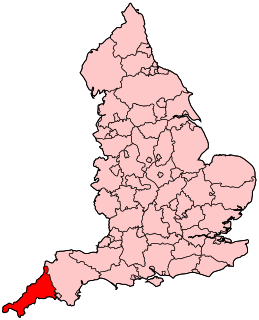
The following outline is provided as an overview of and topical guide to Cornwall: Cornwall – ceremonial county and unitary authority area of England within the United Kingdom. Cornwall is a peninsula bordered to the north and west by the Celtic Sea, to the south by the English Channel, and to the east by the county of Devon, over the River Tamar. Cornwall is also a royal duchy of the United Kingdom. It has an estimated population of half a million and it has its own distinctive history and culture.
References
- ↑ Peter Berresford Ellis (1974). The Cornish language and its literature. Routledge. p. 48. ISBN 978-0-7100-7928-2.